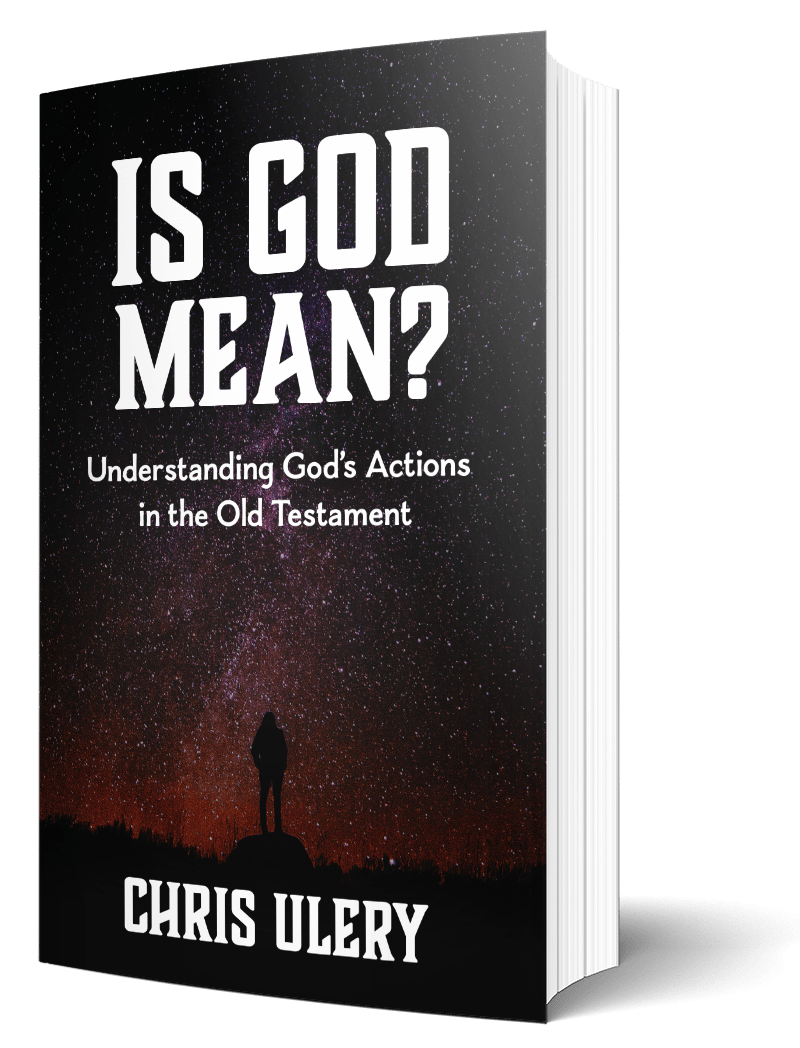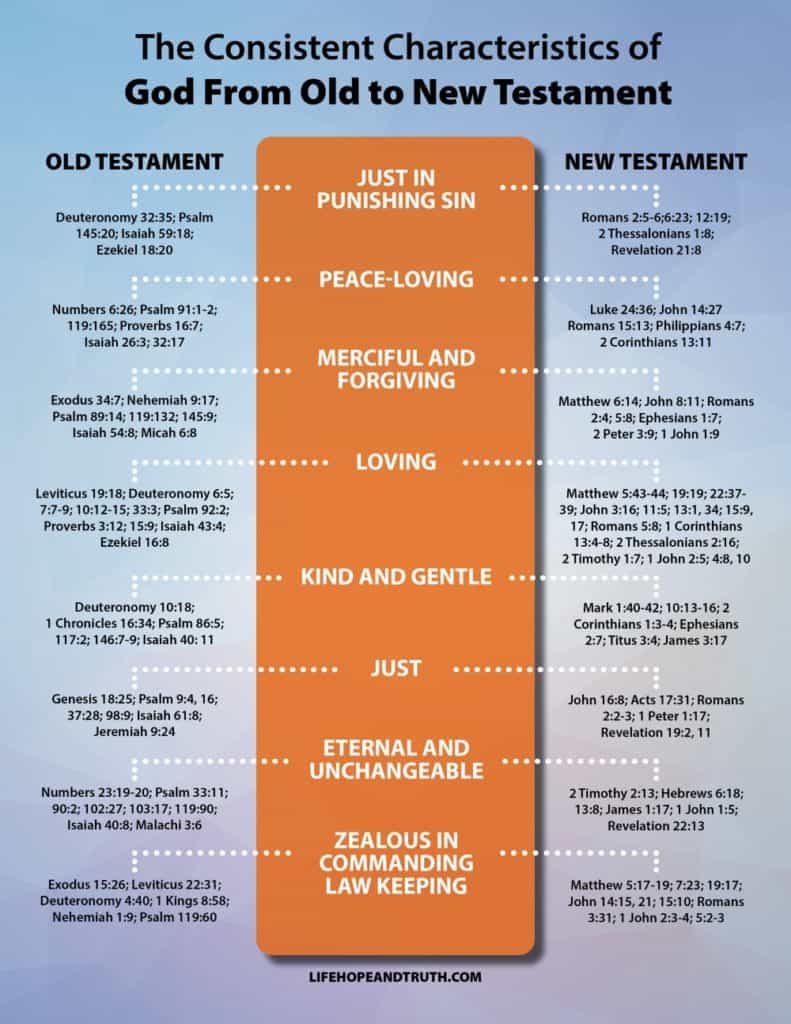Old Testament vs New Testament God
Is God Mean | Episode 1
Next
Is God Mean?
The book
If you enjoy the video series you will LOVE the book!

Enter your Email address for the FREE study guide
Old Testament vs New Testament God
Why does God seem different in the Old Testament?
Deconstruction of faith has become somewhat of a buzzword in our culture as we have seen famous christian authors, famous pastors, and famous worship leaders all come out to publicly renounce their faith. One of things nearly all of them attribute to being a catalyst in their changing beliefs is a seeming inconsistency between the Old Testament and the New Testament. They claim to see a loving and compassionate God in the New Testament, and a harsh and vengeful God in the Old Testament. This seeming inconsistency leads them to believe that the scriptures are flawed and errant, and therefore must not be divine; which ultimately, leads to them turning away from their Faith. But does the Bible actually present two different versions of God? Or does an honest investigation into the Scriptures reveal that God has always been the same? That’s what we’re exploring today, and throughout this entire series.
Richard Dawkins is famously quoted as saying, ” The God of the Old Testament is arguably the most unpleasant character in all fiction: jealous and proud of it; a petty, unjust, unforgiving control-freak; a vindictive, bloodthirsty ethnic cleanser, a misogynistic, homophobic, racist, infanticidal, genocidal, filicidal, pestilential, megalomaniacal, sadomasochistic, capriciously malevolent bully.” …ugh, i feel like i need to wash my mouth out with soap just repeating that.
Unfortunately, you can see from this quote there is a an idea floating around out there that Old Testament God was mean. And, I’ll admit, at face value, there are some pretty challenging things to process in the Bible. Things like God flooding the earth full of women and children, God commanding the Hebrews to wipe out entire people groups, references to slavery in the Bible, eternal torment, and the concept of God creating some people for destruction just to name a few. In later chapters we’re going to explore each one of those things in detail, but for right now, let’s focus on establishing the differences and similarities seen when comparing the New Testament with the Old Testament to see if God really seemed more vengeful in the Old Testament. To properly explore this I’d like to focus on three things.
1. The old testament covers multiple thousands of years while the New Testament only covers a couple hundred

The splitting of the Red Sea – Old Testament vs New Testament God
Well, if you don’t count the book of Revelation that is. Why does this matter? Well, here’s why: The majority of those thousands of years in the Old Testament is God pleading with his people to come to Him, sending prophet after prophet with a message to repent and turn to God, all while he was performing profound miracles to protect and provide for them. They saw the sea split to make a path for them (Exodus 14), the 10 plagues to free them (Exodus 7-11), food miraculously appearing every morning to feed them (Exodus 16), and a pillar of fire to lead them (Exodus 13 & 14)! And that was just one generation! And yet even with all of that undeniable proof and direct divine intervention they were still quick to turn their back on the God who saved them.
The Patient Mercy of God
There’s a reason God is recorded in the Old Testament as being “full of mercy and compassion. The Old Testament refers to Him as a God who does not anger easily and whose forgiveness and mercy endure forever. In fact, Jonah didn’t want to go preach to the barbaric Ninevites because he knew God would forgive and restore them. The Bible records Jonah saying,
“And he prayed to the Lord and said, ‘O Lord, is not this what I said when I was yet in my country? That is why I made haste to flee to Tarshish; for I knew that you are a gracious God and merciful, slow to anger and abounding in steadfast love, and relenting from disaster.'” Jonah 4:2 NIV
Jonah was angry with the Ninevites and didn’t want God to save them when they repented. So he ran away from the call of God because He knew God’s patient mercy was going to extend them every opportunity possible to avoid judgment. Which is exactly what he did. That doesn’t sound like an angry God just waiting to pour out judgment every chance He gets to me. Quite the opposite actually!
God is called “the compassionate and gracious God, slow to anger, abounding in love and faithfulness.” (Exodus 34:6 NIV) and, “the shepherd of his people, for whom he cares deeply.” (See The Holy Bible, Psalm 23, 100) Also, “He is their rock, their refuge, their help, and their deliverer.” (See The Holy Bible, Psalm 18, 107)
For some reason our society seems to hyper-focus on the brief moments of judgement in the Old Testament while completely ignoring it’s primary theme, which is a love story between God and His people and His pursuit of them. Many times those brief acts of Judgement only came after society had devolved into a level of moral depravity and violence that you and I don’t even have a reference point to be able to fathom in this day and age. But I’ll get more into that in a later video. Let’s move on.
For more scriptures on the compassion and love of God in the Old Testament see:
Psalm 8:4; 17:7; 25:8; 33:5; 34:8; 36:7; 52:1, 9; 68:19; 69:16; 73:1; 86:5; 100:5; 106:1; 107:8, 9, 43; 118:29; 135:3; 136:1; 119:64; 139:17, 18; 143:10; and 145:7, 9. Isaiah 63:7
Jeremiah 9:24
Lamentations 3:25
Hosea 3:5
Nahum 1:7
2. God’s Judgment and God’s love are present in both the Old and the New Testament
 Aka, they look the same. Well, the covenant we have with God looks different, but his nature and character look exactly the same. Anytime I hear someone say that God seems different in the Old Testament I immediately think that they must not have read it for themselves and that they’re just parroting what they heard someone else say, because if they had truly studied it for themselves there’s no way they could come to that conclusion.
Aka, they look the same. Well, the covenant we have with God looks different, but his nature and character look exactly the same. Anytime I hear someone say that God seems different in the Old Testament I immediately think that they must not have read it for themselves and that they’re just parroting what they heard someone else say, because if they had truly studied it for themselves there’s no way they could come to that conclusion.
The majority of this series I’m going to be showing you how the Old Testament looks like the New Testament by highlighting the love and compassion found in God’s Old Testament actions, but just for this first video, let me show you how the New Testament actually looks like the Old Testament by highlighting some of the righteous anger and judgement found in Jesus’ words and actions. Even in Jesus’ short human life on the earth, just 33 years (which is far less than the thousands of years of patient mercy found in the Old Testament) l still see Jesus giving a LOT of tough love, the same kind of tough love we see from God in the Old Testament. It doesn’t get much more intense than Hell, a place of eternal torment, and guess what character in the Bible talked about Hell and gave warnings about ending up there more than any other in the Bible? I’ll give you a hint, it starts with a J and ends with esus.
Jesus Warns of Hell
In Luke 16, Jesus describes a chasm over which “none may cross from there to us.” In Matthew 25, Jesus describes how people will be categorized into two groups, one entering into His presence, the other banished to “eternal fire.”
Jesus describes the dark reality of Hell in great detail. He says it is a place of eternal torment (Luke 16:23), of unquenchable fire (Mark 9:43), where the worm does not die (Mark 9:48), where people will gnash their teeth in anguish and regret (Matt. 13:42), and from which there is no return, even to warn loved ones (Luke 16:19–31). He calls hell a place of “outer darkness” (Matt. 25:30), comparing it to “Gehenna” (Matt. 10:28), which was a trash dump outside the walls of Jerusalem where rubbish was burned and maggots abounded. Jesus actually talked about hell even more than he talked about heaven, and He took effort to describe it vividly. Even a casual reading of the Gospels reveals that Jesus knew, believed, and warned against the reality of hell.
Was Jesus always nice?
People tend to only focus on the ‘nice’ parts of Jesus’ life, like saving the woman caught in the act of adultery (John 8:3-11). But the same Jesus that saved that woman was the Jesus that flipped over tables and ran people out of the temple while basically calling them all thieves (John 2:13-16), and it was Jesus who upped the anti on Old Testament laws. In the old testament committing adultery was a sin (Exodus 20:14), but in the New Testament it was Jesus who said if you even LOOK on a woman lustfully then you’ve committed adultery in your heart (Matthew 5:27-28). Or, in the Old Testament murder was a sin (Exodus 20:13), but Jesus said that if you just have hate in your heart you are guilty of murder (Matt. 5:21-22). You know that whole cutting your hand off if it causes you to sin thing. That wasn’t Old Testament Levitical law. That was New Testament Jesus (Matt. 5:30). Without an understanding of the heart behind it, it would appear that Jesus’ commands were actually more strict than the Old Testament’s.
Jesus called the pharisees blind guides (Matt. 15:14), fools (Matt. 23:17), whitewashed tombs (Matt. 23:27), children of the devil (John 8:44), serpents on their way to Hell (Matt. 23:33)! Yes, they were pharisees, and we all love to hate the pharisees. But were the pharisees more sinful than the pagan priests God had to deal with in the Old Testament sacrificing live children and babies for their rituals? I don’t think so. Why is it when Jesus says that someone is a child of the devil on their way to Hell we accept it without question, but when Father God implies it we point the finger and call Him mean and vindictive? What’s with the double standard?
The cost of following Christ
Jesus said Himself in multiple places that He didn’t come to bring peace, but a sword. (Matthew 10:34) and division (Luke 12:51). Jesus said that it would be so bad for those that caused little ones to fall away, that it would be better for a millstone to be tied around their neck and thrown into the sea (Luke 17:2)… He said it would be BETTER for that to happen to them. Let that sink in for a minute. Jesus said that unless you love your family, and even your own life less than you love Him that you can’t be called His disciple (Luke 14:26), and unless you deny yourself, take up your cross and follow Him (in other words die to yourself), that you aren’t worthy to be called a disciple (Matthew 16:24). Jesus made it abundantly clear that choosing to be one of His followers was no joke!
The consistency of scripture
Doesn’t seem so nice any more does it? There are many more examples, but I think you get the point. However, I don’t want you to get me wrong, I am NOT trying to say that Jesus was not loving. On the contrary, I believe EVERYTHING Jesus did was motivated by love. Even these things I’ve mentioned that appeared harsh were motivated by love, AND so were Father God’s actions in the Old Testament! What I’m trying so hard to convey is that the Bible is not inconsistent! Someone recently commented on one of my videos, “Christian theologians agree that the New Testament has a single and consistent theological focus on the salvific nature of Christ, but the Old Testament consists of several different theologies.” What I want to highlight, is that although there may have been different areas of focus in the Old Testament, the nature and character of God have always been the same. Just like you and I may go through different seasons in life, we still remain us through them all. Likewise, God has always been the loving and compassionate God He is now through both the Old and New Testmanent “seasons.” The scriptures make it clear that God is the same, “yesterday, today, and forever” (Hebrews 13:8, see also Malachi 3:6, James 1:17).
Looking past the surface level

Jesus drives the thieves from the temple – Old Testament vs New Testament God
3. Jesus loved and worshiped the God of the Old Testament.
As a society, collectively we trust Jesus’ character. Yet, for some reason our society seems unable to do that with Father God in the Old Testament. Yet, the scriptures that Jesus read, meditated, and taught from was what we now know as the Old Testament. He was familiar with all those harsh stories and He never once put into question God’s character, but instead he actually reaffirmed the Old Testament’s authority over and over again. He said, ‘The Scripture cannot be broken’ (John 10:35). He referred to Scripture as ‘the commandment of God’ (Matthew 15:3) and as the ‘Word of God’ (Mark 7:13). He even highlighted that He had not come to abolish the law, but to fulfill it. He said,
“Do not think that I have come to abolish the Law or the Prophets; I have not come to abolish them but to fulfill them. For truly I tell you, until heaven and earth disappear, not the smallest letter, not the least stroke of a pen, will by any means disappear from the Law until everything is accomplished. Therefore anyone who sets aside one of the least of these commands and teaches others accordingly will be called least in the kingdom of heaven, but whoever practices and teaches these commands will be called great in the kingdom of heaven. Matthew 5:17-19 NIV
If He would have thought the law to be evil or unloving He would never have sought to fulfill it. While having dealings with the people of his day, whether it was with His followers, the pharisees, or even while rebuking Satan in the desert, Jesus consistently quoted, rebuked, encouraged and taught from the Old Testament: “But Jesus said, ‘It is written, ‘Man is not to live on bread only. Man is to live by every word that God speaks.’” Matthew 4:4-6 NLV; While instructing the way to eternal life Jesus quoted the 10 commandments “… ‘You shall not murder, you shall not commit adultery, you shall not steal, you shall not give false testimony, honor your father and mother,’ and ‘love your neighbor as yourself.’” (Matthew 19:18 NIV); and while challenging the Sadducees Jesus quotes the Torah “And as for the resurrection of the dead, have you not read what was said to you by God: ‘I am the God of Abraham, and the God of Isaac, and the God of Jacob’? He is not God of the dead, but of the living.” (Matthew 22:31–32, cf. Mark 12:26, 27, Luke 20:37-38). There are many, many examples of Jesus teaching from the Old Testament. Jesus knew the Old Testament and its content well. He quoted from it often and seems to have trusted it totally.
We even find Jesus confirming accounts in the Old Testament that some have claimed revealed an angry Old Testament God, such as the destruction of Sodom and the death of Lot’s wife (Luke 17:29, 32). Along with other very early historical accounts such as the murder of Abel by his brother Cain (Luke 11:51), and popular well known stories such as the calling of Moses (Mark 12:26), and the manna given in the wilderness (John 6:31–51).
There’s no getting away from it, the God that Jesus loved and worshiped as His Heavenly Father is the God whose story is found in the pages of the Old Testament. If you’re truly going to trust Jesus, then you’re going to have to trust His heavenly Father too.
What has changed?
The only thing that has changed, is our covenant with Him. Yes, we have a different kind of connection with Him now because of what Jesus did for us, but His heart and love for us is still exactly the same. We no longer have to perform all of the rituals, nor are we restricted to only entering into God’s presence once a year. Now, thanks to Jesus’ sacrifice on the cross, we can come boldly before the throne of grace any time we want! (Hebrews 4:16) God’s ultimate goal was always intimacy with us. In the old testament, sin got in the way. So He created all those rituals and rules not to be mean, but to create a way to continue to live with His beloved humanity even before Jesus had paid the price for our sins. God is just and couldn’t just turn his back on sin. The price for sin had to be paid, thus the shedding of blood we find so often in the Old Testament. These rituals allowed a level closeness between God and His people, but it was still far from the constant intimacy He truly desired with us. Thus, God and Jesus, in their great desire for us, worked together to find a way to restore the intimacy we had originally been created for. Now we can respect Him for His refusal to compromise His justice, and love Him for His dedication to create a way, even at the highest of costs, to restore relationship with us! His great pursuit of us is truly mesmerizing!
The exact representation of God’s being
So in conclusion, the nature and character that we see in Father God in the Old Testament, is the same character and nature we see in Jesus in the New Testament. Jesus truly was “…the exact representation of his being…” (Hebrews 1:3 NIV). The old testament deserves our trust, and throughout this book we are going to see how diligent and honest study of the Old Testament will reveal the same loving nature and character that we all recognize in Jesus.
Next
Is God Mean?
The book
If you enjoy the video series you will LOVE the book!
How could a loving God flood the whole earth full of people, including women and children? How could a loving God send people to an eternal torment for temporal mistakes? Did God really command genocide and violence in the Old Testament? What about slavery, misogny, and polygamy that God seems to ignore and even endorse?
If you’ve found these questions lurking in the back of your mind, or if you’ve found yourself paralyzed when confronted with these questions by unbelievers, then this book is for you. This book reveals that the love of God is the central feature throughout the Old and New Testaments by explaining the loving motives behind the seemingly harsh actions in the Old Testament.

CONTACT US
If you need prayer, have a question about the Bible, or are interested in a live event we would love to speak you. Click the button or use the form to send us a message!

Message Me
Don’t miss an episode
Subscribe to be notified when new materials are released.